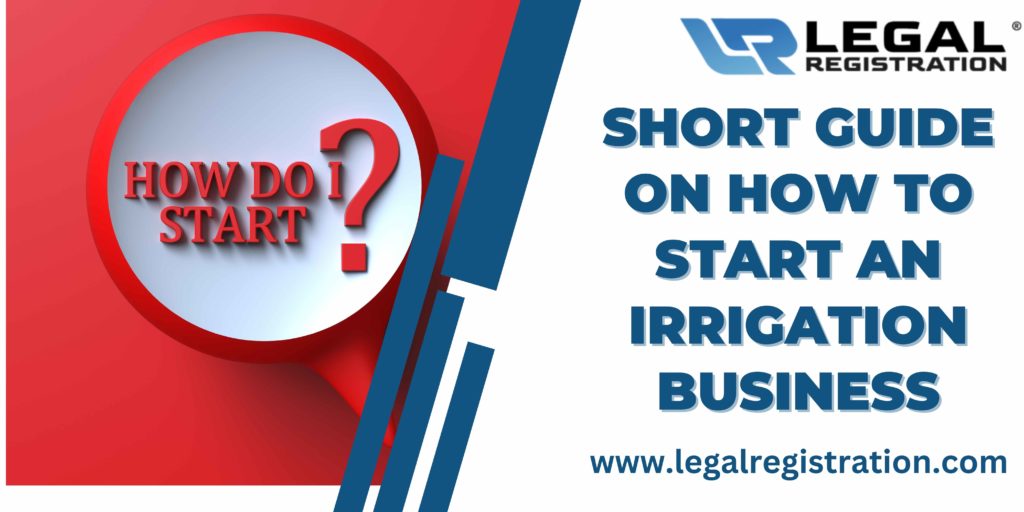Short Guide on How to Start an Irrigation Business


Certified irrigation contractor
Irrigation systems are necessary for many enterprises and average citizens. There is no shortage of consumers who require high-quality watering systems, from homeowners to farmers, public lands, sports grounds, and beyond. Those who live in very arid regions with little rainfall need irrigation throughout the year. Through LegalRegistration.com, you can form an LLC in no time.
This blog post will discuss how to start an irrigation business and essential things to consider.
Make a Business Plan
For an entrepreneur to know how to start an irrigation company, they must have a clear plan. You can use it to map out your company’s specifics and identify some unknowns. A few crucial things to think about are:
- How much will the first and ongoing costs be?
- Who is your intended audience?
- How much are clients allowed to pay?
- What will the name of your company be?
- How much does it cost to start an irrigation company?
Tubing/piping, sprinklers, a variety of digging tools, staff, insurance, a workspace, utilities, computers, printers, and a high-speed Internet connection are all the required things for an irrigation firm. Below are the other important aspects you will cater to. For more information visit the website LabyrinthTM Fundraising Compliance
What recurring costs are there for an irrigation company?
Laborers are needed by irrigation enterprises to install and maintain irrigation systems. The usual hourly wage for these employees is between $10 and $18. White-collar personnel will also be needed as your company expands. At least $12 to $15 per hour is what a receptionist will be paid. The pay of an office manager will range from $30,000 to $45,000 annually. Professionals in accounting and marketing will seek annual salaries between $35,000 and $50,000 per year.
Who is the intended audience?
An ideal customer is a person or business with numerous properties that need a plentiful supply of water. Examples include farmers, government agencies, companies, and people who own large homes with attractive landscaping and green spaces. Focus on recent residential construction and business locations with lots of greenery.
How does an irrigation company generate revenue?
Installing and maintaining irrigation systems to supply grass, bushes, landscaping, crops, athletic fields, and other green spaces with water will generate revenue for you. Please give LegalRegistration.com a phone call if you need more information.
How much are clients allowed to pay?
A quarter-acre lot’s irrigation system installation costs between $3,000 and $4,000. The upkeep of irrigation systems requires constant work. Depending on how severe they are, you might charge anywhere from $100 to $500 or more for repairs.
How much revenue can an irrigation company generate?
In the first year or two of business, you might not make a lot of money. You will succeed in business if you stick with it, grow your clientele, and choose the best equipment for your needs without going over budget. After several years of operation, it is feasible to earn six figures or more. You may make between a quarter million and a half million dollars a year if you expand your business throughout the area. You may make millions of dollars a year if your company really takes off and becomes a certified irrigation contractor franchise. Get more information Sole Proprietor
How can you increase the profitability of your company?
Offering irrigation system repair services can increase revenue. Offer to retrofit, and you’ll succeed in a market with little rivalry. Opportunities for adapting outdated systems will abound as irrigation system technology advances. The present that keeps on giving is this. A sizable portion of customers will pay for yearly upgrades to improve the functioning and effectiveness of their irrigation system.
What Are the Benefits of an Irrigation System?
An irrigation system is an underground watering system for your house. It offers you, the homeowner, a lot more control over when and how much water is applied to your grass. The pipe network is buried 8–12 inches underground. Sprinkler heads will be strategically positioned all across the lawn to increase the efficacy and efficiency of your watering.
The pipes, valves, and sprinkler heads function as one pressure system. When the valve opens, the water flows through the pipe for a specific area, pushing the sprinkler heads above the ground as they spray water. When the valve closes, the water stops, and the heads retract below the ground once more. These sprinkler heads can be installed with a portion of the sprinkler head above ground if you’re using them in a garden to prevent foliage blockages. Check out the article Hit & Run
Beneficial Function of Irrigation Controller
Through an irrigation controller, you may regulate the valves’ opening and closing times. It gives the valves instructions on when to open and close. A rain sensor is an extra item that is a fantastic investment. When it rains, a rain sensor alerts the controller that the lawn doesn’t need to be watered. You can set your rain sensor to delay irrigation watering for up to 48 hours following a rainfall event, depending on the model.
These systems have a number of advantages, including convenience and the potential for significant financial savings. Installing this system can be very beneficial if you frequently travel or are away from home because it eliminates any uncertainty about whether your landscaping will be watered.
Saving Cash
You may save money and contribute to water conservation by installing an irrigation system. If watched, timed, and adjusted properly, watering your lawn with a hose or oscillator may be a huge water waste. It will take time and money to replace your plants and grass if you drown them or overwater them. You may pick how much water is needed, target specific areas, and lower your water bill expenses with an irrigation system that is correctly planned and installed. For additional information Category
The Elements of an Irrigation System
Preventer of Backflow
Water often only flows in one direction in water systems. Water can occasionally reverse its flow, causing backflow. This must be prevented for a variety of reasons, including tainted water reentering the City’s water supply. Your irrigation system needs a backflow preventer to function properly. All irrigation systems in Ontario must now be equipped with a tested backflow prevention device.
Valve Box and Valves
You’ll find your wire splices, manifold, and valves in the sprinkler valve box. The valve box may be set up in a garden either under the mulch or flush with the grass. We usually advise creating a solid record drawing after your system is established since it is an essential component of the system and must be identified if you bury it under mulch.
Valve Master
When there is damage or water loss, the master valve is a crucial valve. At the main water supply, there is an electronic valve. If you have leaky valves or a pressure line leak, it lowers water loss. If a repair is required, the master valve can assist avoid cutting off the main water supply.
Area Valves
The zones in your irrigation system are activated by the zone valves. Typically, only one zone may operate simultaneously. Until that region has enough water, your controller will switch on each zone valve for a certain amount of time. Water from the pressure line is held back by the zone valves, which are fed by the pressure line until the controller opens the valve. This valve opens to let water into the zone line, which causes the drip or sprinklers to operate.
Unmoving Spray Head
Common applications for these sprinklers include tiny grass patches or gardens. They are available at various heights and may spray from 5 to 18 feet. 2”,4”, 6” and 12”. These sprayers have a predetermined arc pattern. Additional information Business Licensing
Rolling Head
These sprinklers, which are used for wide lawn expanses, feature a single spray that may reach 30–50 feet. To cover their arc pattern, these heads spin.
Rough Line
The most efficient and effective approach to irrigating your plant beds is via drip lines. In order to irrigate your garden in a grid pattern, drip lines are placed down row by row, spaced 12 to 18 inches apart, until the entire area is covered. The drip effectively feeds the roots of your plants when it is laid beneath the mulch and has very little evaporation, wind, or wastewater loss.
Importance of Maintenance
An irrigation system will need some care during its lifetime, just like most wonderful things in life do. You may prevent tragedy and costly repairs by doing preventative maintenance. You are keeping up with minor details here and there by doing this, which enables it to function at its best.
Cleaning your sprinkler heads on a regular basis can ensure optimal operation. As they emerge from the earth and reappear, dirt and grass will become lodged in them, so you should thoroughly clean them once a month. It might be problematic if they become trapped in their upright posture. If you don’t see them, they might be destroyed by the lawnmower, trampled by people strolling on the grass, or even harmed by extra dirt and debris being trapped.
You must winterize your irrigation system if you reside somewhere where the winters are chilly and frosty. This may be a difficult task, but it is better to complete it before it gets too cold outside to avoid having a pipe or your backflow system freeze and break, which would require a costly repair in the spring. Before it gets below freezing, any water that has built up in the pipes has to be blasted out. Consult a specialist to assist you if you are unable to complete this on your own. Get more information on Legal Registration Archives
Installation Fees
To ensure that the task is done correctly the first time, hiring a professional to install your New Jersey irrigation services corp system is useful. It may also save you time and money compared to doing it yourself. The price will vary depending on the size of your lawn, the complexity of the system, and the cost of the desired components. Before picking a contractor, it’s usually a good idea to compare a few quotations from reliable experts in your region. Choose a contractor that is licensed by the Irrigation Association and has a clean record with Landscape Ontario. To learn more check the link below Form an LLC
If you’re willing to take on the challenge of doing this large project yourself, you can save a lot of money by visiting your neighborhood irrigation contractor, having them design the system, pull the pipe for you with their vibratory plow for a clean installation, and selling you the necessary products. Before they go, make sure they give you a lesson on how all the items work together.


